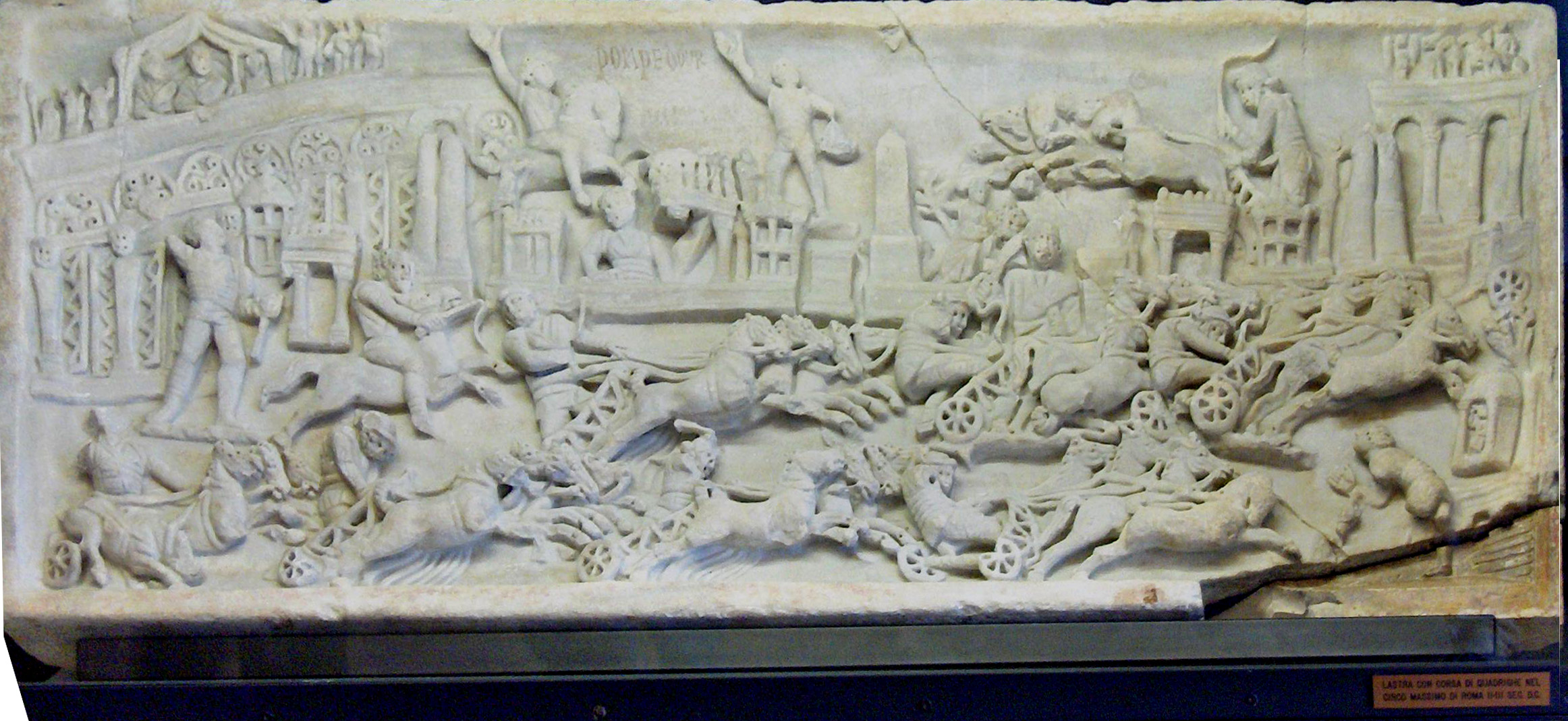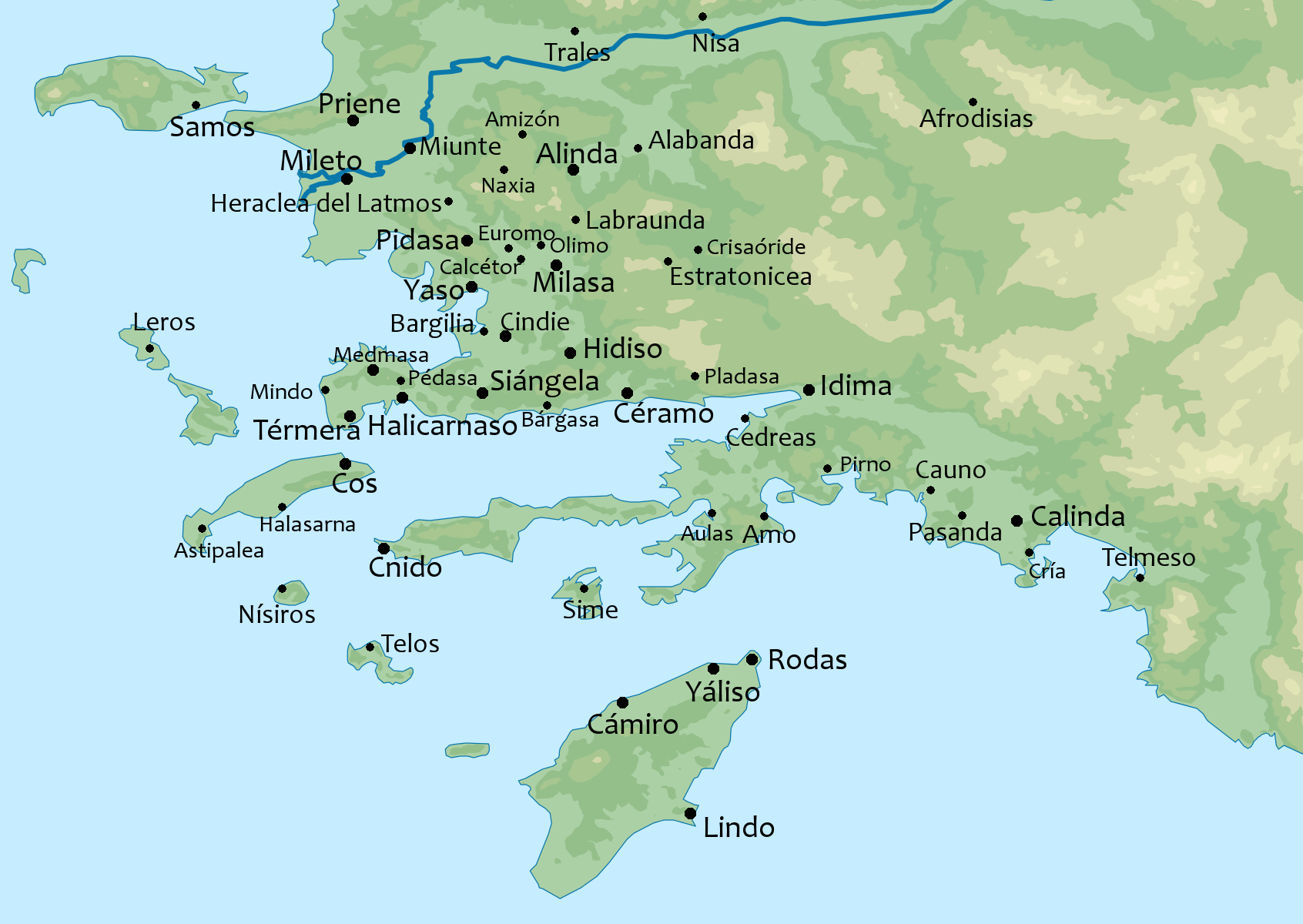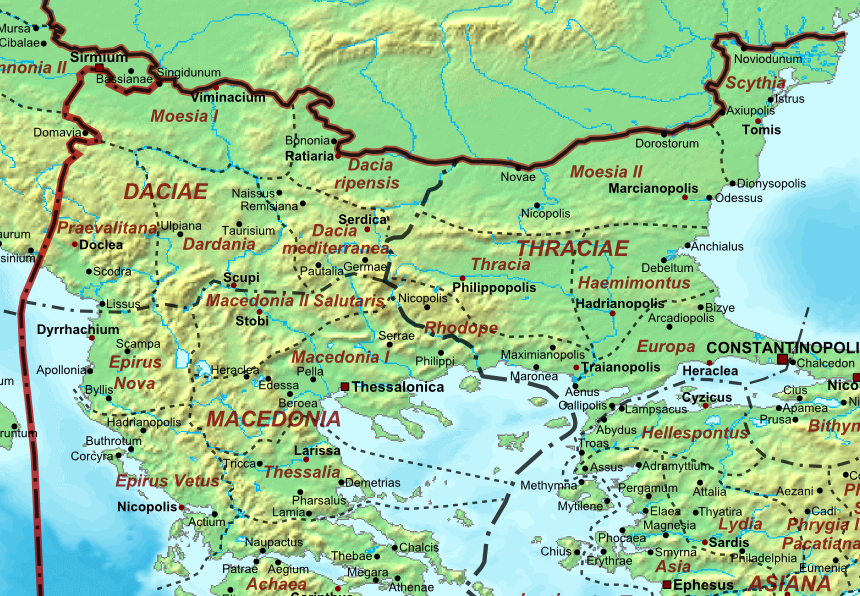|
Actia
In Ancient Roman religious tradition, Actia (Greek: '')'' was a festival of Apollo, celebrated at Nicopolis in Epirus, with wrestling, musical contests, horse racing, and sea battles. It was reestablished by Augustus, in commemoration of his victory over Mark Antony off Actium in 31 BC; that it was probably the revival of an ancient festival is suggested by the celebrated temple of Apollo at Actium, which is mentioned by Thucydides, and Strabo, and which was enlarged by Augustus. The games instituted by Augustus were celebrated every five years (', ''ludi quinquennales''); they received the title of a sacred '' agon'' and were also called Olympia. Stadium of Nikopolis This ancient stadium was located in the so-called 'Proasteion' (sacred grove) of the Graeco-Roman city of Nikopolis. Together with the nearby gymnasium, theatre and hippodrome it was the location of the famous Actian Games. These games, which featured athletic, equestrian and musical events, were first held in ... [...More Info...] [...Related Items...] OR: [Wikipedia] [Google] [Baidu] |
Nicopolis
Nicopolis ( grc-gre, Νικόπολις, Nikópolis, City of Victory) or Actia Nicopolis was the capital city of the Roman province of Epirus Vetus. It was located in the western part of the modern state of Greece. The city was founded in 29 BC by Caesar Augustus in commemoration of his victory in 31 BC over Antony and Cleopatra at the Battle of Actium nearby. It was soon made the major city of the wider region of Epirus. Many impressive ruins of the ancient city may be visited today. History Foundation In 29 BC, 2 years after his victory in the naval battle of Actium, Octavian founded a new city which he called Nicopolis (the City of Victory), located on the southernmost promontory of Epirus, and across the mouth of the harbour from the ancient town of Actium. This foundation echoed a tradition dating back to Alexander the Great, and more recently illustrated by Pompey, founder of Nicopolis in Little Armenia (63 BC). Symbolically, the new city represented one e ... [...More Info...] [...Related Items...] OR: [Wikipedia] [Google] [Baidu] |
Ludi
''Ludi'' (Latin plural) were public games held for the benefit and entertainment of the Roman people (''populus Romanus''). ''Ludi'' were held in conjunction with, or sometimes as the major feature of, Roman religious festivals, and were also presented as part of the cult of state. The earliest ''ludi'' were horse races in the circus (''ludi circenses''). Animal exhibitions with mock hunts ('' venationes'') and theatrical performances (''ludi scaenici'') also became part of the festivals. Days on which ''ludi'' were held were public holidays, and no business could be conducted—"remarkably," it has been noted, "considering that in the Imperial era more than 135 days might be spent at these entertainments" during the year. Although their entertainment value may have overshadowed religious sentiment at any given moment, even in late antiquity the ''ludi'' were understood as part of the worship of the traditional gods, and the Church Fathers thus advised Christians not to pa ... [...More Info...] [...Related Items...] OR: [Wikipedia] [Google] [Baidu] |
Apollo
Apollo, grc, Ἀπόλλωνος, Apóllōnos, label=genitive , ; , grc-dor, Ἀπέλλων, Apéllōn, ; grc, Ἀπείλων, Apeílōn, label=Arcadocypriot Greek, ; grc-aeo, Ἄπλουν, Áploun, la, Apollō, la, Apollinis, label=genitive, , ; , is one of the Twelve Olympians, Olympian deities in Ancient Greek religion, classical Greek and Ancient Roman religion, Roman religion and Greek mythology, Greek and Roman mythology. The national divinity of the Greeks, Apollo has been recognized as a god of archery, music and dance, truth and prophecy, healing and diseases, the Sun and light, poetry, and more. One of the most important and complex of the Greek gods, he is the son of Zeus and Leto, and the twin brother of Artemis, goddess of the hunt. Seen as the most beautiful god and the ideal of the ''kouros'' (ephebe, or a beardless, athletic youth), Apollo is considered to be the most Greek of all the gods. Apollo is known in Greek-influenced Etruscan mythology as ' ... [...More Info...] [...Related Items...] OR: [Wikipedia] [Google] [Baidu] |
Ancient Olympics In Various Places
In Greek antiquity, athletic festivals under the name of "Olympic games", named in imitation of the original Olympic games at Olympia, were held in various places all over the Greek world. Some of these are only known to us by inscriptions and coins; but others, as the Olympic festival at Antioch, obtained great celebrity. After these Olympic festivals had been established in several places, the great Olympic festival itself was sometimes designated in inscriptions by the addition of Pisa. * Aegae in Macedonia. This festival was in existence in the time of Alexander the Great. * Alexandria. In later times, the number of Alexandrian conquerors in the great Olympic Games in Elis was greater than from any other state. *Anazarbus in Cilicia. Lately introduced games. * Antioch at Daphne, a small place, 40 stadia from Antioch, where there was a large sacred grove watered by many fountains. The festival was originally called Daphnea, and was sacred to Apollo and Artemis, but was ca ... [...More Info...] [...Related Items...] OR: [Wikipedia] [Google] [Baidu] |
Actium
Actium or Aktion ( grc, Ἄκτιον) was a town on a promontory in ancient Acarnania at the entrance of the Ambraciot Gulf, off which Octavian gained his celebrated victory, the Battle of Actium, over Antony and Cleopatra, on September 2, 31 BCE. History Actium belonged originally to the Corinthian colonists of Anactorium, who probably founded the sanctuary of Apollo Actius. This temple was of great antiquity. In the 3rd century BCE it fell to the Acarnanians, who subsequently held their religious summits there. There was also an ancient festival named Actia, celebrated here in honour of the god. Augustus after his victory enlarged the temple, and revived the ancient festival, which was henceforth celebrated once in five years (πενταετηρίς, ludi quinquennales), with musical and gymnastic contests, and horse races. We learn from a Greek inscription found on the site of Actium, and which is probably prior to the time of Augustus, that the chief priest of ... [...More Info...] [...Related Items...] OR: [Wikipedia] [Google] [Baidu] |
Battle Of Actium
The Battle of Actium was a naval battle fought between a maritime fleet of Octavian led by Marcus Agrippa and the combined fleets of both Mark Antony and Cleopatra VII Philopator. The battle took place on 2 September 31 BC in the Ionian Sea, near the former Roman colony of Actium, Greece, and was the climax of over a decade of rivalry between Octavian and Antony. In early 31 BC, the year of the battle, Antony and Cleopatra were temporarily stationed in Greece. Mark Antony possessed 500 ships and 70,000 infantry, and made his camp at Actium, and Octavian, with 400 ships and 80,000 infantry, arrived from the north and occupied Patrae and Corinth, where he managed to cut Antony’s southward communications with Egypt (via the Peloponnese) with help from Marcus Agrippa. Octavian previously gained a preliminary victory in Greece, where his navy successfully ferried troops across the Adriatic Sea under the command of Marcus Agrippa. Octavian landed on mainland Greece, opposite ... [...More Info...] [...Related Items...] OR: [Wikipedia] [Google] [Baidu] |
Ancient Roman Festivals
Ancient history is a time period from the beginning of writing and recorded human history to as far as late antiquity. The span of recorded history is roughly 5,000 years, beginning with the Sumerian cuneiform script. Ancient history covers all continents inhabited by humans in the period 3000 BCAD 500. The three-age system periodizes ancient history into the Stone Age, the Bronze Age, and the Iron Age, with recorded history generally considered to begin with the Bronze Age. The start and end of the three ages varies between world regions. In many regions the Bronze Age is generally considered to begin a few centuries prior to 3000 BC, while the end of the Iron Age varies from the early first millennium BC in some regions to the late first millennium AD in others. During the time period of ancient history, the world population was already exponentially increasing due to the Neolithic Revolution, which was in full progress. While in 10,000 BC, the world population stood ... [...More Info...] [...Related Items...] OR: [Wikipedia] [Google] [Baidu] |
Aphrodisias
Aphrodisias (; grc, Ἀφροδισιάς, Aphrodisiás) was a small ancient Greek Hellenistic city in the historic Caria cultural region of western Anatolia, Turkey. It is located near the modern village of Geyre, about east/inland from the coast of the Aegean Sea, and southeast of İzmir. Aphrodisias was named after Aphrodite, the Greek goddess of love, who had here her unique cult image, the ''Aphrodite of Aphrodisias''. According to the Suda, a Byzantine encyclopedic compilation, before the city became known as Aphrodisias (c.3rd century BCE) it had three previous names: ''Lelégōn Pólis'' (Λελέγων πόλις, "City of the Leleges"), ''Megálē Pólis'' (Μεγάλη Πόλις, "Great City"), and ''Ninó''ē (Νινόη). Sometime before 640, in the Late Antique period when it was within the Byzantine Empire, the city was renamed ''Stauropolis'' (Σταυρούπολις, "City of the Cross").Siméon Vailhé, "Stauropolis" ''The Catholic Encyclopedia'', 191fu ... [...More Info...] [...Related Items...] OR: [Wikipedia] [Google] [Baidu] |
Roman Epirus
The province of Epirus ( la, Provincia Epiri, grc, Ἐπαρχία Ἠπείρου, Eparkhía Ēpeírou) was a province of the Roman Empire, covering the region of Ancient Epirus. Rome first annexed the region in 167 BC, in the aftermath of the Third Macedonian War, and initially put the region in the larger Roman province of Macedonia, which at the time covered the whole of the Hellenistic world in mainland Europe. In 27 BC, Epirus and Achaea were separated from Macedonia and grouped into the senatorial province of Achaea, with the exception of its northernmost part, which remained part of the province of Macedonia. Under Emperor Trajan, sometime between 103 and 114 AD, Epirus became a separate province, under a ''procurator Augusti''. The new province extended from the Gulf of Aulon (Vlorë) and the Acroceraunian Mountains in the north to the lower course of the Acheloos River in the south, and included the northern Ionian Islands of Corfu, Lefkada, Ithaca, Cephallonia, and Z ... [...More Info...] [...Related Items...] OR: [Wikipedia] [Google] [Baidu] |
Laodicea Combusta
Laodicea Combusta ( grc, Λαοδίκεια Κατακεκαυμένη, ''Laodikeia Katakekaumenê'', "Laodicea the Burned") or Laodicea ( el, Λαοδίκεια), and later known as Claudiolaodicea, was a Hellenistic city in central Anatolia, in the region of Pisidia; its site is currently occupied by Ladik, Konya Province, in Central Anatolia, Turkey. Laodicea was one of the five cities built by Seleucus I Nicator and named after his mother Laodice. Its surname ( la, Combusta) is derived by Strabo (from the volcanic nature of the surrounding country), but Hamilton asserts that there is not a particle of volcanic or igneous rock in the neighbourhood, and it may be added that, if such were the case, the town would rather have been called, in Greek, ''Laodikeia tês katakekaumenês''. The most probable solution undoubtedly is that the town was at one time destroyed by fire, and that on being rebuilt it received the distinguishing surname. It was situated to the northwest of Ic ... [...More Info...] [...Related Items...] OR: [Wikipedia] [Google] [Baidu] |
Ancient Greek Athletic Festivals
Ancient history is a time period from the beginning of writing and recorded human history to as far as late antiquity. The span of recorded history is roughly 5,000 years, beginning with the Sumerian cuneiform script. Ancient history covers all continents inhabited by humans in the period 3000 BCAD 500. The three-age system periodizes ancient history into the Stone Age, the Bronze Age, and the Iron Age, with recorded history generally considered to begin with the Bronze Age. The start and end of the three ages varies between world regions. In many regions the Bronze Age is generally considered to begin a few centuries prior to 3000 BC, while the end of the Iron Age varies from the early first millennium BC in some regions to the late first millennium AD in others. During the time period of ancient history, the world population was already exponentially increasing due to the Neolithic Revolution, which was in full progress. While in 10,000 BC, the world population stood ... [...More Info...] [...Related Items...] OR: [Wikipedia] [Google] [Baidu] |
Cleopatra
Cleopatra VII Philopator ( grc-gre, Κλεοπάτρα Φιλοπάτωρ}, "Cleopatra the father-beloved"; 69 BC10 August 30 BC) was Queen of the Ptolemaic Kingdom of Ancient Egypt, Egypt from 51 to 30 BC, and its last active ruler.She was also a diplomat, Ancient navies and vessels, naval commander, linguist, and Ancient Greek medicine, medical author; see and . A member of the Ptolemaic dynasty, she was a descendant of its founder Ptolemy I Soter, a Ancient Macedonians, Macedonian Greek general and Government of Macedonia (ancient kingdom)#Companions, friends, councils, and assemblies, companion of Alexander the Great. writes about Ptolemy I Soter: "The Ptolemaic dynasty, of which Cleopatra was the last representative, was founded at the end of the fourth century BC. The Ptolemies were not of Egyptian extraction, but stemmed from Ptolemy Soter, a Macedonian Greek in the entourage of Alexander the Great."For additional sources that describe the Ptolemaic dynasty as ... [...More Info...] [...Related Items...] OR: [Wikipedia] [Google] [Baidu] |







